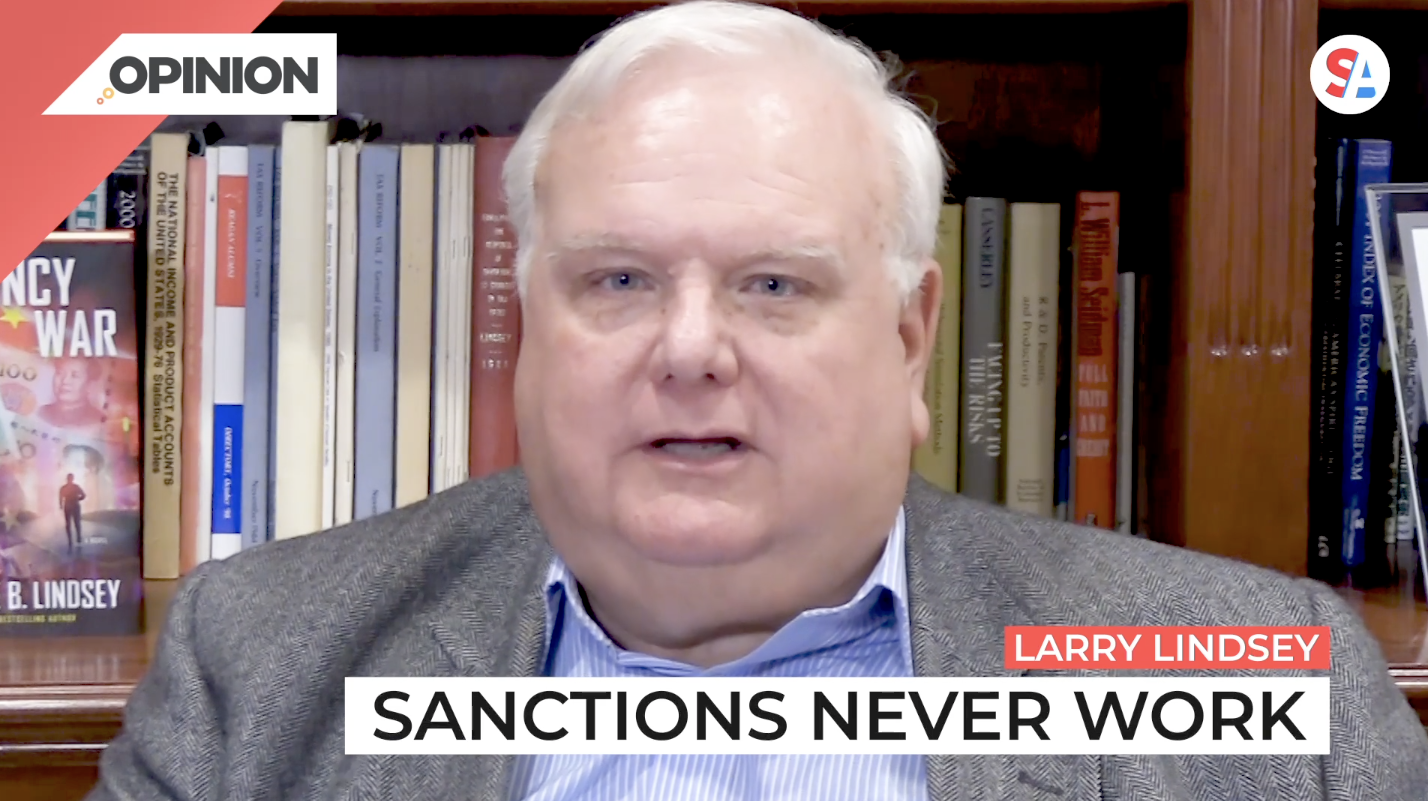
Commentary
-
Our commentary partners will help you reach your own conclusions on complex topics.
There’s a lot of talk about sanctions lately, particularly on Russia. It is the plan of the administration and some of our European allies that we will put on devastating sanctions, some call them unprecedented sanctions in order to stop the Russians from invading Ukraine.
Well, the Russian UN ambassador said, we’ve been sanctioned so many times, we’ve lost count, we’ve learned to live with it. And he has a point.
It’s not whether they deserve to be sanctioned or not. I probably think they do, but it’s that we in the west and in America really never get our act together when it comes to sanctions.
The Senate, for example, has been working on a sanctions bill and they just managed to not come up with one. There wasn’t any real partisan disagreement, but they couldn’t decide on what sanctions to impose.
Then you can think back to the sanctions before the Iraq war. We imposed them on Saddam Hussein who had broken UN security council resolutions.
They seemed tough, but our European allies, particularly the Germans, simply found a way of getting around them. They had something called the oil for food program. Saddam sold the oil to the Germans and supposedly money that was going to be used for food for the Iraqi people. Instead, it went into Saddam’s pocket and those of his family and his henchman.
Then in 2014, Putin invaded Ukraine before he took Crimea, which is a peninsula in the Black Sea, on the Southern coast of Ukraine.
President Obama said, we’re imposing sanctions, this will not stand. Well, here we are eight years later, and it’s still standing. Those sanctions didn’t work.
Or then there’s the famous Iran sanctions. Yes, we’ve tried to sanction Iran, but we never seem to be able to stick to it. Most recently, the administration announced that it will end its sanctions on the civilian part of the Iranian nuclear program. There is no difference between the civilian and the military part of the Iranian nuclear program.
It’s just a way of us kind of weaseling our way out of the sanctions we’ve imposed.
And then there’s the issue of what happened at the Beijing Olympics. You have to remember here was a case of sanctions. In this case for the athletes of Russia being given drugs to enhance their performance. Doping. If you will.
Russia was banned from attending the Olympic games. They’ve done this over and over again. Well, the problem is, is that Russia was banned. The Russian athletes were not. They simply went under something called the Russian Olympic committee.
Well, in fact, they actually came in second in the total number of medals received, even though Russia technically was not even at the game. And we had president Putin there cheering on his athletes. Now, there was no national Anthem played. And there were no medals that you could say I’m from Russia if you were a Russian athlete. But that didn’t really matter. Did it? They got to participate, and Putin got to cheer them on.
And amazingly one of those athlete elites was caught taking illegal drugs. But it turned out they really didn’t want to sanction her and she was allowed to compete anyway.
So what we have here is a long-term failure of sanctions because we basically will not stick to them and nor will our allies. I don’t think the sanctions are going to work.
I think instead what you’re going to see is the Russians doing a long game of playing with their usual strategy. They will try and shift their timing. They’ll try and shift their use of forces. They won’t tell us what’s going on because they know that when it comes to sanctions, time is on our side.
Our allies have already started to break away. The Germans, for example, refuse to even allow its NATO allies access to their airspace to send weapons to Ukraine.
Well, if that’s going to happen, you can pretty much bet the sanctions aren’t going to work.
-
President Biden just isn’t cool
For some Americans, politics is only about policy, while others prioritize core values, ideas, aspirations or beliefs. Still, for others, politics may be a reflection of culture, where voting serves as a symbolic act to proclaim cultural group identity. But for some Americans, who they vote for and support is more of a popularity contest,…
-
Federal Reserve policy should be more restrictive
The American economy is booming, with high GDP growth, record-low unemployment, and wage gains for median workers. Over the past few quarters, U.S. economic growth indicators have consistently outperformed official projections. But the U.S. Federal Reserve recently conceded that its policies might be too restrictive, hindering the full potential of the U.S. economy, which the…
-
Celebrate tight labor market, but don’t cut interest rates
While President Joe Biden has been celebrating U.S. economic success, many Americans are still unhappy about the economy. So who’s right? The most recent jobs report for February showed that while the unemployment rate rose slightly to 3.9%, job gains were higher than expected, with the total coming in at 275,000 versus the expected increase…
-
Social and economic class will define 2024 election
Following in the footsteps of FDR, Democratic support in the past hundred years has drawn largely from working-class individuals, labor unions, and civil society organizations. Republican support, conversely, tended to rely upon larger corporate donations and the support of high-income individuals. In 2024, these traditional roles are evolving, and the new reality of campaign finance…
-
Black swan events make next US president difficult to predict
In November, Americans will cast their votes to elect a new president and Congress. Despite significant indicators suggesting dissatisfaction with the economy, posing a challenge for President Biden’s potential reelection, predicting the winner remains challenging due to all the variables at play. Straight Arrow News contributor Larry Lindsey utilizes a recent Gallup poll to offer…
Latest Opinions
-
 Getty Images
Getty Images
More Dems signal willingness to save Johnson from speakership vote
-
 Getty Images
Getty Images
NASA worm returns as interest in space grows around the world
-
 Reuters
Reuters
SF DA seeks restitution for drivers delayed by Golden Gate Bridge protest
-
 Getty Images
Getty Images
Mexico disrupts China’s potential plan to infiltrate US EV market
-
 Getty Images
Getty Images
Free speech fight after USC cancels valedictorian’s speech
Popular Opinions
-
In addition to the facts, we believe it’s vital to hear perspectives from all sides of the political spectrum.


